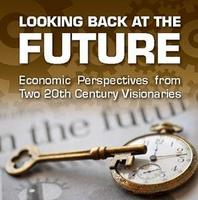Looking Back at the Future
Economic Perspectives from Two 20th Century Visionaries John Maynard Keynes & Yehuda Ashlag (Baal HaSulam) by Seth Bogner
The current Global Economic Crisis has affected virtually every country. No corner of the world that has been left untouched by the most severe recession in 80 years. Most nations have reacted to the Crisis by following the economic theories of John Maynard Keynes, reputably the foremost economist of the 20thCentury. Keynes believed that government intervention and spending is the best way out of a financial crisis. His theories were the basis of the strategies employed by both the US and UK in response to the Great Depression. Many economists, central bankers and pundits frequently cite Keynesian economics when discussing the various economic stimulus programs enacted globally to attempt to combat the Crisis.
Vision of Global Economic Health
Would Keynes, if he were alive, believe that we would have found ourselves in a quandary similar to the Great Depression all over again? probably not. Keynes envisioned a vastly different picture of global economic health for our generation. In 1930 in his rarely discussed article, “Economic Possibilities for our Grandchildren” Keynes predicted an end or evolution of capitalism. In fact, he foresaw this as a highly desirable eventuality.
Keynes anticipated that by now all the world’s economic problems would be solved. Goods and services would be produced at a level to sustain all of humanity and the means to distribute them to all would end the struggle for subsistence. He predicted that improvements in productivity due to technological advancements would increase and together with the accumulation of capital, would solve the world’s economic problems. Keynes observed, “We shall be able to rid ourselves of many of the pseudo-moral principles which have hag-ridden us for two-hundred years, by which we have exalted some of the most distasteful of human qualities into the position of the highest virtues. … therefore, to return to some of the most sure and certain principles of religion and traditional virtue –that avarice is vice, that the exaction of usury is a misdemeanour, and the love of money is detestable, that those walk most truly in the paths of virtue and sane wisdom who take least thought for the morrow. We shall once more value ends above means and prefer the good to the useful.”
While the most renowned economist of the 20th Century was promoting his vision of economic and social possibilities for his grandchildren, the most highly recognized Kabbalist of the 20th Century, Yehuda Ashlag (widely known as Baal HaSulam) was sharing his forward looking world view, which was remarkably similar to those of Keynes. Although contemporaries, Keynes (1883 – 1946) and Ashlag (1884 – 1954) probably never met. Ashlag’s theories were rooted in the Wisdom of Kabbalah. If Ashlag were alive today he would probably have told us that the reason for the Crisis was man’s unwillingness to recognize we operate in a global interdependent system, mankind will only renounce its economic system when the system brings more suffering for society than pleasure. His views were based on one of Kabbalah’s central tenants, if humanity does not work together to correct our egotistical nature and start acting in concert with nature we would bring blows upon mankind of biblical proportions. According to him we could avert the impending suffering by educating people about our inherent nature and providing society with an alternative path.
An Evolved Economic Reality
The current Economic Crisis is sending us a message that the capitalism, of our time, must adapt or become extinct, both Keynes and Ashlag foresaw this eventuality 80 years ago. They predicted that the hubris that has been celebrated in our generation will give birth to a new economic reality where capitalism will evolve into a new system. In Keynes’ words, “The critical difference will be realized when this condition [freedom from concern about basic survival needs] has become so general that the nature of one’s duty to one’s neighbour is changed. For it will remain reasonable to be economically purposive for others after it has ceased to be reasonable for oneself.” Keynes trusted in the inherent generosity and morality of mankind. Unfortunately, mankind has not lived up to his expectations.
Given the accuracy of their vision, perhaps it is time for us to listen to their views on the next stage of socioeconomic development. Their views are remarkably similar: both agree that people must reach a state where concern for other members of the society outweighs concern for self-promotion and they also agree that this transition will not be easy. In fact, Keynes saw this as “the greatest change which has ever occurred in the material environment of life for human beings in the aggregate.” For Ashlag, it represents nothing less than the transformation of human nature from egoism to altruism. In “The Last Generation” Ashlag observed that “our planet is rich enough to provide for all of us, so why this tragic war for life which has been clouding our lives for generations? Let us divide the work and its produce equally among ourselves and end all the troubles.”
